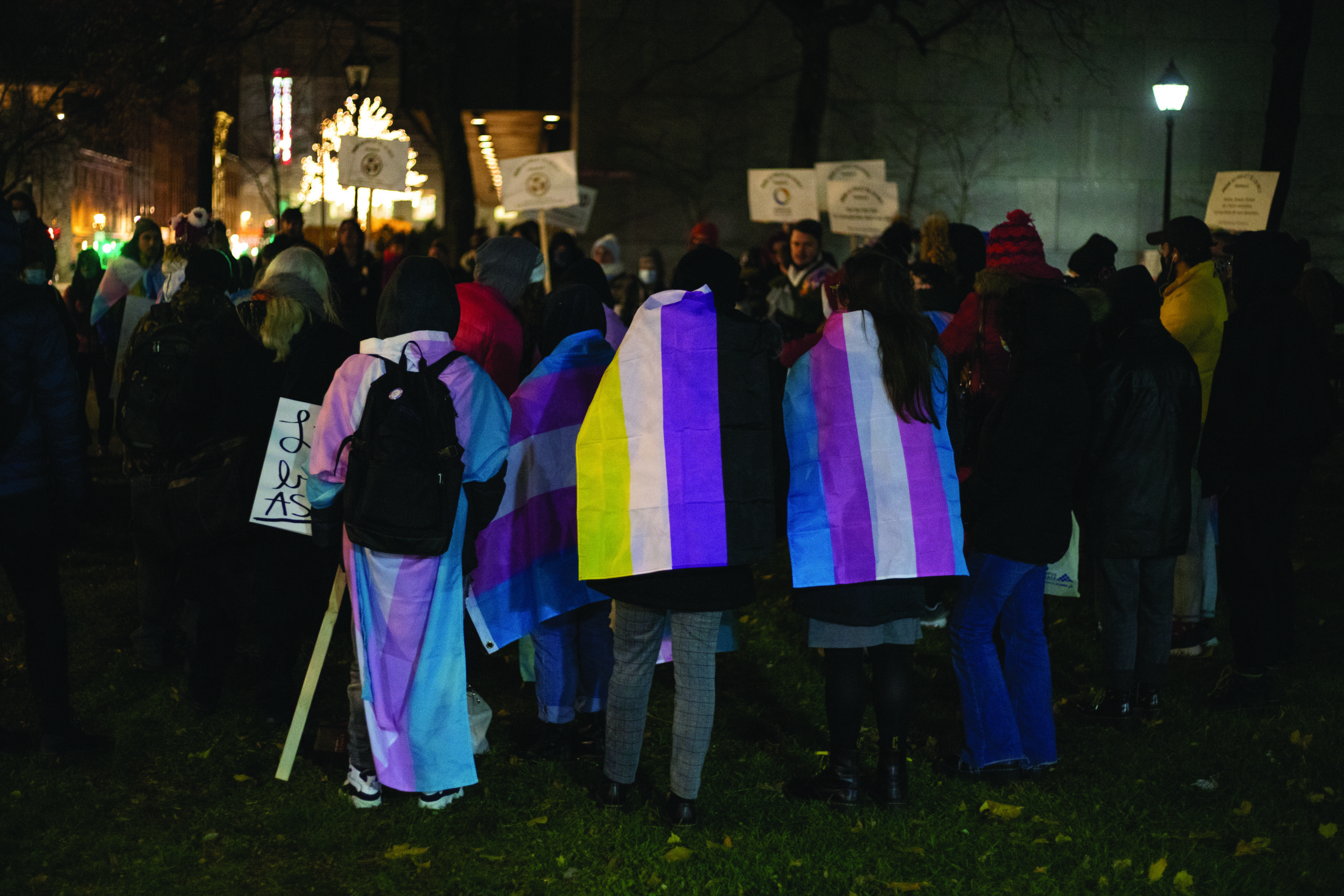A march in solidarity with the transgender community precedes Nov. 20, the Transgender Day of Remembrance
Kicking off a weekend of events for the Transgender Day of Remembrance on Nov. 20, Aide aux Trans du Québec (ATQ) held a solidarty march for the gender plurality community of Quebec in front of the Montreal Courthouse on Nov. 19.
The march, which saw over 50 people in attendance, was held to so show support for the trans, non-binary, and gender non-conforming community, as well as to protest the proposed Bill 2. Notably, Manon Massé, one of the leaders for Québec solidaire, was present at the march.
Bill 2 would make it a requirement for people to undergo gender-affirming surgery if they want to change their assigned sex on their birth certificate. The bill would also make it so there is a new section for gender on birth certificates, with the possibility of a third non-male or female gender. Another aspect of the bill is that intersex people would have to apply for a change of designated sex as soon as possible.
“This really is a place for the whole trans community and allies to just to pour out our grievances against the Coalition Avenir Québec (CAQ) government for proposing the most transphobic bill ever introduced in Quebec and Canada,” said Celeste Trianon, a trans rights advocate at the Centre for Gender Advocacy (CGA) and a speaker at the march.
The CGA is a Concordia fee-levy group that promotes gender equality and empowerment, specifically as it relates to marginalized communities. The centre does various programming, campaigns, advocacy, and has resources and services open to Concordia and the LGBTQIA2+ community.
“[Bill 2] would lead to so much harm for trans people,” said Trianon, who explained that not all trans people would want genital surgery, and that the wait times for such a surgery could be up to five years.
They explained that without a recognized photo ID, people will struggle to apply for employment and housing.
“It’s like another coming out for people, and we don’t want that,” said Trianon.
Jason Noël, the treasurer, secretary, and event planner for ATQ, explained that the on the weekend of the Transgender Day of Remembrance, there were multiple events planned throughout the day, such as conferences and brunches.
“We are going to have a moment of silence,” said Noël, who explained that Nov. 20 is to remember the trans people that have disappeared and raise awareness of the violence against the trans community. “It’s a very special thing, I would say it is one of the most important parts of trans pride.”
“We are hoping that for the night, people will be able to forget everything that’s happening in the world right now,” said Noël, who stated that because of COVID-19 they had to delay trans pride three times, and the weekend would mark the first time since the pandemic began that the trans community of Montreal would be able to come together and party.
“We’re just gonna dedicate the dance floor to the people who are not with us anymore, who disappeared because of violence,” said Noël. “And then the next morning […] we will go to brunch and that will be super fun.”
According to Noël, multiple organizations will be going to court to try and reform the bill on Nov. 29, but it may be delayed until December or later in 2022.
“It’s a bill that’s bringing us back like 15 years,” said Noël, who criticized Canada and Quebec for appearing to be supportive of trans rights while allowing this bill to be proposed.
According to an article by the CBC, this bill is being presented as a victory for transgender people by the Quebec government, but could actually put trans people in a dangerous situation by outing them every time they show their ID.
“Get involved, be at protests, denounce the CAQ, hold your friends and entourage to do the same.” said Trianon. “We need more people to speak out against this bill.”
Photograph by Catherine Reynolds
